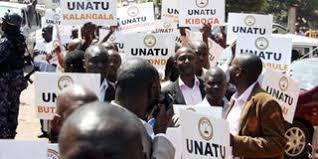By Jumah Kakomo
The Opposition Uganda People’s Congress (UPC) party is calling on all stakeholders to urgently address the ongoing crisis in the education sector, sparked by a nationwide strike by arts teachers protesting unequal pay and broken government promises.

The strike, organized by the Uganda National Teachers Union (UNATU), began on September 15, 2025, and has seen varying levels of participation across the country. While some teachers continue to report to work, many have stayed home in solidarity with the cause.
At the heart of the protest is the long-standing salary disparity between science and arts teachers. Currently, secondary school science teachers earn up to 2.8 million Ugandan shillings, while their arts counterparts earn significantly less—around 800,000 shillings. UNATU is demanding equal salary enhancement for all teachers, regardless of the subjects they teach.
The union is also pushing for a minimum monthly wage of 1.35 million shillings for primary school teachers, who currently earn a meagre 490,000 shillings before taxes.

UPC spokesperson Arach Oyat Sharon emphasized the disruptive impact of the strike, noting that many learners have been sent home or are idly engaging in non-academic activities due to absent teachers. She urged the government to harmonize salaries across all teaching subjects and levels, stressing the need for fairness and equal treatment.

“This strike is affecting learning nationwide. The government must eliminate salary disparities and promote equity in the education sector,” Arach said.
UPC Head of Media and Communications, Faizo Mezeyi, echoed the call for reform, stating that teachers from nursery, primary, and secondary levels, as well as those in higher institutions, have consistently demanded better pay and improved working conditions.
“There have been numerous meetings between professional bodies and government, with repeated commitments to salary enhancements,” Mezeyi said. “However, the issue has always been with implementation. This inconsistency demotivates teachers and ultimately affects the performance of our pupils and students.”

Mezeyi also criticized the current policy of prioritizing science teachers in salary enhancements, saying it creates the impression that arts teachers are less important.
“UPC believes in equity and fairness. The current salary structure implies that arts-related subjects are of lower value, which is both inaccurate and harmful. The gap must be bridged, and all teachers paid reasonable, fair salaries,” he added.
The UPC also recalled that its president, Hon. Jimmy Akena, had previously warned the government three years ago in Parliament about the dangers of such discriminatory policies. Today, the fallout from those warnings is being realized in the form of this disruptive strike.

